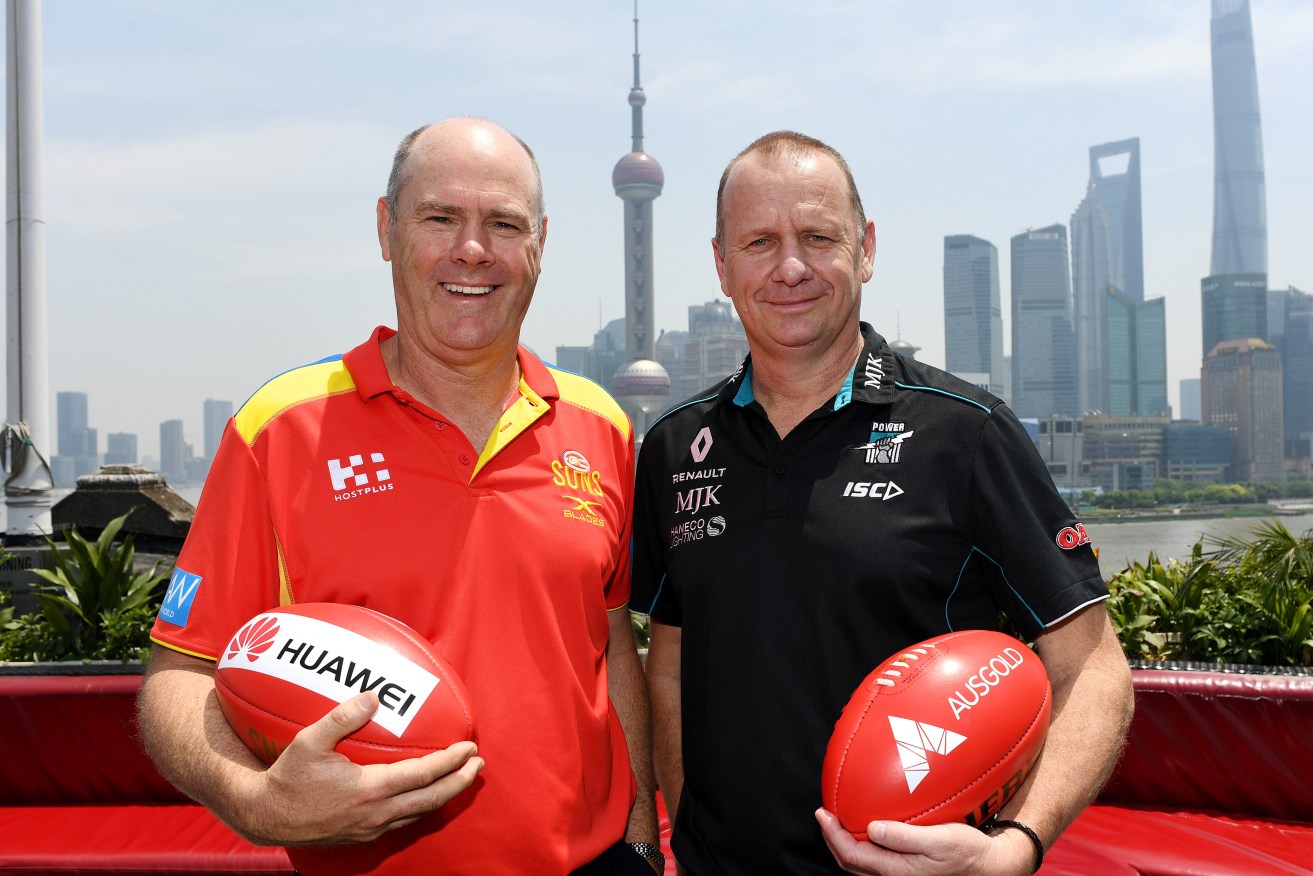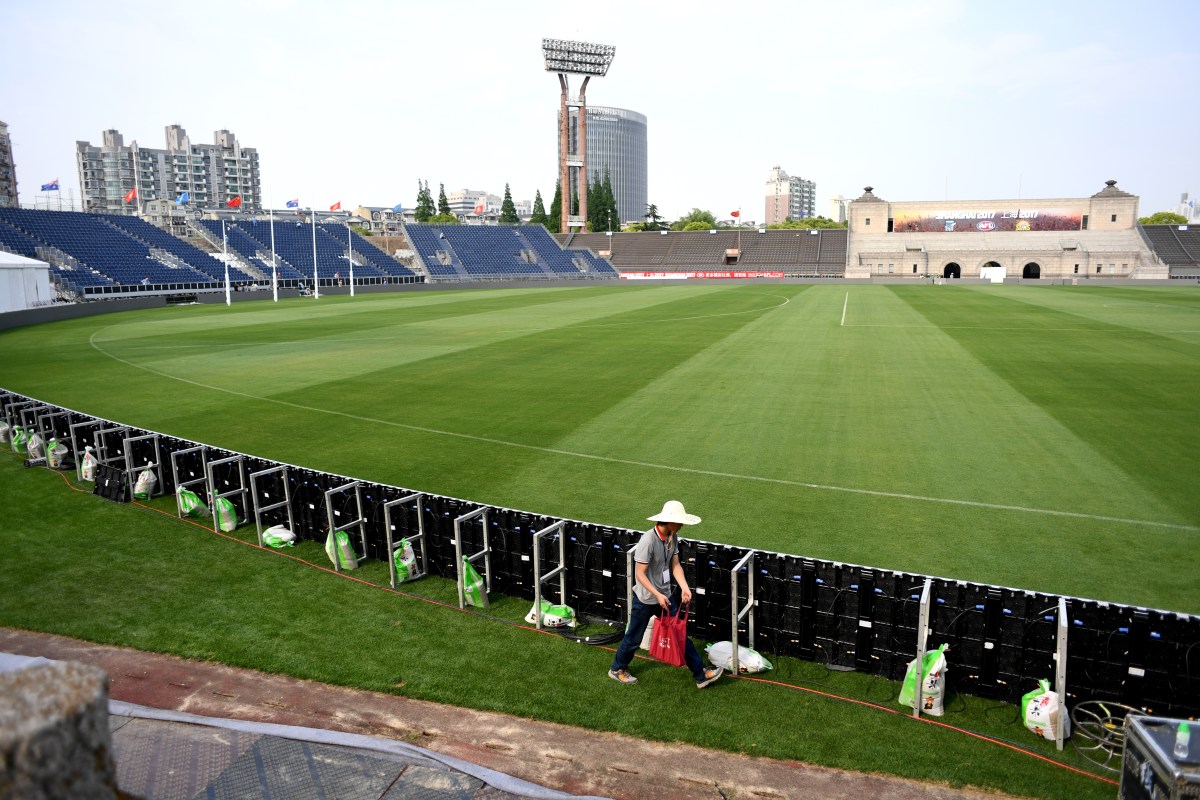How Port learned to dream big, and dream “crazy”
Remember the tarps. They go a long way to explaining why Keith Thomas is sitting in a squat concrete grandstand at Shanghai’s Jiangwan Stadium, talking about China.

Suns coach Rodney Eade and Power coach Ken Hinkley at a Bar Rouge media call in Shanghai. Photo: Tracey Nearmy / AAP
In front of him, Port Adelaide are training on a pristine oval that has been converted from soccer fields for Sunday’s historic AFL match against Gold Coast.
Club officials say around half the capacity crowd of 11,000 will be Power fans who have flown in from home.
The two clubs CEOs and Chairmen speaking to the media at the Portman Ritz-Carlton in Shanghai #Shanghai2017 pic.twitter.com/jOt20wI0Ch
— Port Adelaide FC (@PAFC) May 12, 2017
It could not be further removed than the 1970s and six suburban VFL games starting at 2.10 on a Saturday afternoon.
Like all radical projects, it is heavy with risk and the critics are lining up to have a shot.
A sandstorm sweeping through Shanghai around 1pm on Sunday would not help.
If St Kilda abandoned Wellington after three years and are yet to secure a venue in Auckland, why is Thomas sitting in a Shanghai grandstand?
For a start, it beats the hell out of those bloody tarpaulins.
When Thomas become Port’s chief executive in 2011, the club was in big trouble.
The team was struggling and inevitably, the fans weren’t coming.
To compensate for the growing number of empty seats, the tarpaulins were stretched over whole bays at AAMI Stadium.
The sponsor logos printed on them may as well have been tombstones.
But slowly, Port turned around their fortunes.
High-profile president David Koch came on board, as did coach Ken Hinkley.
Port roared up the ladder in 2013 and ’14, returning to the finals, and SA football moved to a redeveloped Adelaide Oval. Never Tear Us Apart became Port’s anthem.
Happy birthday to us! From a local sporting club to bringing @AFL to China and all of the flags in between, thanks for being there with us! pic.twitter.com/PzCRE6xQ9D
— Port Adelaide FC (@PAFC) May 12, 2017
Still, even with bigger crowds, a better stadium deal and no more tarpaulins, Port was still a long way off financial security.
“We realised that coming to Adelaide Oval wasn’t going to be the answer to all of our financial problems,” Thomas said.
“It could not have launched better – and we made a small loss in 2014.
“At that point, we started to think ‘how do we grow? And where does this club go?’”
Koch was already saying that Port needed to look beyond their postcode. A move into the eastern states for sponsors was well underway.
But Port needed an uncontested market.
And so over the last three years, the push into China has grown from a conversation with two expatriate supporters from Hong Kong into a fully-fledged strategy.

The finishing touches are put on the Jiangwan stadium ahead of Sunday’s clash. Photo: Tracey Nearmy / AAP
“It started with ‘we can’t save our way out of this, we have to invest’,” Thomas said.
“That really is the same thinking going on here, now – have a go.
“And David is a champion for innovation and having a crack … to do crazy things.”
There are two important differences between the stalled push into New Zealand and what Port are doing in China.
First, China is club-led – Port were well down the track with the project before they approached the AFL for help.
Second, unlike NZ, the focus is not game development. This is first and foremost about developing business and government ties.
And Thomas warns that it will take time.
As he notes, the Chinese think long-term – usually in centuries.
Putting on Sunday’s game has cost $4 million, with the money coming from Tourism Australia and Chinese businesses, and he has already recommended to the AFL that Port play a game in Shanghai for five years.
“Anything else, it looks a little bit Mickey Mouse,” he said.
“In a market like China, you have to invest in the relationship.
“Success to us at this point is that the Chinese government, our Chinese partners and to a smaller degree the Chinese public see that the AFL and Port Adelaide are serious about the relationship we’re trying to build.
“That underpins anything you do next.”
-AAP




